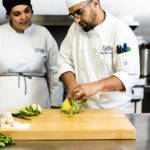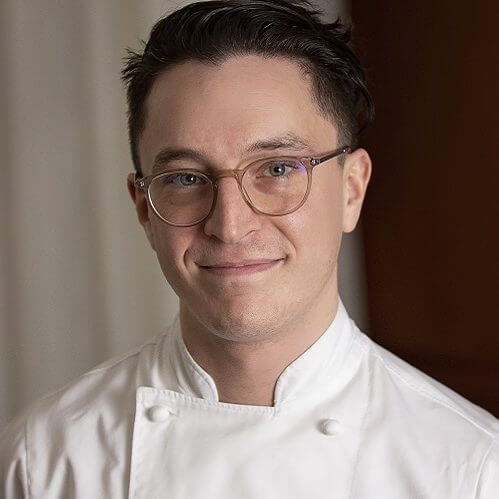Making a good first impression is critical, especially if you’re joining a team that already runs like a well-oiled machine. Once you step foot into a kitchen as a brand new chef, you have a huge opportunity to make a name for yourself and set your career on a positive trajectory.
It’s a good idea to observe and absorb as much as you can as a new chef, particularly before inserting your own ideas and methods into the established systems of the kitchen. You will likely learn a lot (and quickly!) about the kitchen environment and employees by paying close attention and taking everything in.
Here are some qualities that employers look for in new chefs, with tips for how you can stand out as a dependable and trustworthy team member, starting your industry reputation off on the right foot.
Knowledge of Kitchen Operations
Among the most important chef skills is, of course, knowledge of the craft. Food preparation involves many moving parts and various responsibilities, so having all of the foundational knowledge of the inner workings of a kitchen will make you a valuable member of the brigade de cuisine.
Besides knowing roles, responsibilities, techniques, and best practices, you’ll also need to be very attentive to sanitation. Employers look for new chefs that take the appropriate measures to keep their equipment and workspace clean without prompting. In fact, this is something many hiring managers take note of in the interview and demonstration process.
Having a formal culinary education isn’t required to be a chef, but it will certainly help with laying the groundwork, so that you’re an asset to the kitchen staff upon hire, instead of after months of training.
Auguste Escoffier School of Culinary Arts offers a variety of flexible degree and diploma programs that can help you prepare for a career in the culinary arts. Whether online or in-person, you can benefit from a balanced curriculum in food service techniques, methodologies, business foundations, and operations — plus an industry externship for hands-on experience. From kitchen terminology to hierarchy of management to global cuisine preparations, you can begin your culinary career with confidence.
“Students from the [Escoffier] online program — I was very, very impressed when I saw the energy and skills and knowledge they were bringing to the company.”
Michael Pythoud, Culinary Director, Walt Disney World Deluxe Resorts
Ability to Multitask
That the kitchen is a busy place is an understatement. Suffice to say that in order to thrive as a new chef, you’ll need outstanding multitasking skills. The ability to think fast and make quick decisions is vital to keep kitchen operations and the restaurant itself running smoothly.
The brigade de cuisine relies on efficiency from each team member in order to prepare each recipe accurately, deliver food in a timely manner, deal with high volumes of orders at once, and respond to special requests correctly. Having the ability to multitask while staying calm and level-headed will serve you well.

Organization is key to multitasking effectively and maximizing productivity. Not only does disorder in the kitchen waste precious time, but messiness reflects poorly on the team member. Don’t know the first thing about how to organize your workstation? Unsure of the appropriate mise en place to set your workday up to run smoothly? Escoffier’s culinary programs can teach these important chef skills and many more.
“What I think makes Escoffier the best culinary school for us to recruit from is the fact that their graduates are predictable. I know they have been trained properly, and I know they have a real passion for providing quality food for our customers.”
Mary Ann Mathieu, Senior Recruiter, Sodexo
Time Management
While many new chefs are excellent at their craft, it’s usually the soft skills that make or break any employer-employee relationship, and restaurants are no different. Time management ranks highly on the list of desirable skills for new chefs. Knowing how to prioritize, delegate, and develop your own necessary routines are all crucial qualities to make you a valued contributor in the kitchen.
As a new chef, you’ll need to know at all times what’s happening now and what’s happening next. Based on staff availability at any given moment, you may need to fill in for someone, to delegate responsibilities, or to shift your current task to something else. A thorough knowledge of how long each task takes will help you estimate the time required to complete it and plan accordingly.
When it comes to time management, knowing what to prioritize can often be a challenge when just starting out in a new workplace. To help quickly figure this out, you can often break down the task list into two categories: urgent vs. important.
Urgent tasks are time sensitive, so they require immediate attention. In the kitchen, these tasks might include correcting an order the customer was dissatisfied with or ensuring a filet de boeuf does not become overcooked. Important tasks, on the other hand, are generally considered to be vital to the business, but not time sensitive. They’re important tasks (like rolling silverware or stocking side stations for the following day), but they don’t demand you to drop everything in order to get them done.
“When I hire an Escoffier student, I know that I’m going to get someone with talent, creativity, and passion for the art.”
Holden O’Leary, Escoffier Culinary Arts Graduate & Executive Chef, Jolynn’s Food and Spirits
Teamwork
It goes without saying that teamwork is a cornerstone in almost any kind of career, and this is certainly true of the kitchen. The ability to take orders, compromise, and support others will behoove you as a new chef — and throughout the rest of your career. There’s no room for inflexibility when demands abound. And one of the best ways you can make an excellent first impression is to offer to jump in wherever needed during busy times.
Having a strong work ethic can set you apart in the kitchen. Practically, this looks like always showing up on time, giving 100% when you’re on the clock, and volunteering to do a little extra when it’s needed. Be willing to gracefully take feedback and learn from your mistakes. Not only will the rest of the team trust you as a reliable coworker, but you’ll stand out as someone who truly cares about the welfare of the restaurant and the staff over your personal agenda.
“I’ve hired Escoffier students in the past because I’ve noticed a different work ethic that they possess that some other culinary students don’t. It was very consistent: hard-working and positive attitudes.”
Josh Hasho, Executive Chef, Omni Hotels & Resorts
Emotional intelligence involves knowing how to read the room and respond appropriately, and this is important especially in times of high stress. Know what needs to be said or done now, and what can wait until the tension in the room is alleviated a bit. Often as a chef, hectic times in the kitchen may require you to give directions, and emotional intelligence can help you communicate assertively without coming off as rude or bossy.
Restaurants have many quality control processes to ensure nothing is half-done or left unfinished. Being a team player involves jumping in to complete tasks that must be done — even if they’re not technically your responsibility. Of course, address any ongoing issues with incomplete tasks, whether that means talking to a superior or disciplining someone who reports to you while offering them support.

Asking Questions and Making Suggestions
Finally, gently offering suggestions for improvement as a new chef shows that you’re committed to your craft and the success of the kitchen. While a culinary education can help prepare you for a career in a restaurant, every kitchen will be different. Take some time to learn the ropes, being sure to clarify any questions you have along the way — just choose your timing appropriately, say between the lunch and dinner rush!
If you see inefficiencies, don’t just complain. Proactively seek out a potential solution before bringing suggestions to your higher-ups. There are times when your efforts may not result in the change you’re looking for, and that needs to be okay with you. Remember, kitchens are typically a hierarchy, and orders are taken from the top-down. But that doesn’t mean that executive staff aren’t open to communication from their team.
“My career is on a faster track because of culinary school. Back when I started working, the supervisor was just sort of there to help me out. But now they ask for my opinion on how to do things.”
Damian Palacios, Escoffier Online Culinary Arts Student & Line Cook, Bubba Gump Shrimp Company
Passion and curiosity show that you’re committed to your profession and the evolution of the industry. If the Chef de Cuisine encourages creativity, count yourself fortunate! Many restaurants are eager for new chefs to pitch ideas. Even if not, keep experimenting on your own time, so you can keep your passion alive for years to come.
Consider finding a mentor who can guide you through the early (or advanced) stages of your career. Not only can you bring questions to this person, but often they can offer support and tips from their own experiences working in a kitchen.

Escoffier Chef Instructor mentoring a student
Learning Opportunities Abound in the Kitchen
If you’re a new chef who wants to stand out, be positive! Keep in mind that if you’re working in any kitchen, you’ve got something many people want. So even if it’s not your dream job, it could be an important stepping stone in your career. A positive attitude will help you make a great impression, and you might find yourself with ample networking opportunities.
Learn everything you can while you’re employed in any kitchen. These skills will help you in the future — whether you’re doing them yourself or delegating them to your own team.
Get a strong educational foundation from culinary school and pastry school with Escoffier. Complete coursework on one of our campuses or online. Each of our programs includes a hands-on industry externship where you can gain real-world experience in a restaurant or hospitality environment to practice the skills you’ve acquired.
Was this article helpful? Try these next!
- How to Train as a Chef
- How Chefs Can Build Standout Resumes
- 5 Important Networking Tips for All Chefs
This article was originally published on November 22, 2019, and has since been updated.


 “What I think makes Escoffier the best culinary school for us to recruit from is the fact that their graduates are predictable. I know they have been trained properly, and I know they have a real passion for providing quality food for our customers.”
“What I think makes Escoffier the best culinary school for us to recruit from is the fact that their graduates are predictable. I know they have been trained properly, and I know they have a real passion for providing quality food for our customers.” “When I hire an Escoffier student, I know that I’m going to get someone with talent, creativity, and passion for the art.”
“When I hire an Escoffier student, I know that I’m going to get someone with talent, creativity, and passion for the art.” “I’ve hired Escoffier students in the past because I’ve noticed a different work ethic that they possess that some other culinary students don’t. It was very consistent: hard-working and positive attitudes.”
“I’ve hired Escoffier students in the past because I’ve noticed a different work ethic that they possess that some other culinary students don’t. It was very consistent: hard-working and positive attitudes.” “My career is on a faster track because of culinary school. Back when I started working, the supervisor was just sort of there to help me out. But now they ask for my opinion on how to do things.”
“My career is on a faster track because of culinary school. Back when I started working, the supervisor was just sort of there to help me out. But now they ask for my opinion on how to do things.”